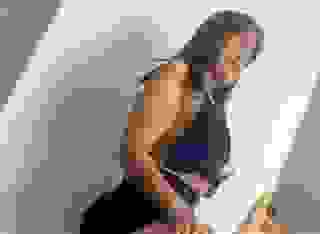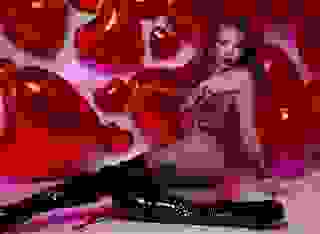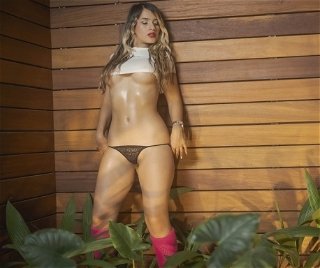- Novels and Novellas
- Corsair Pt. 02 Ch. 02: Dinner
Note: You can change font size, font face, and turn on dark mode by clicking the "A" icon tab in the Story Info Box.
You can temporarily switch back to a Classic Literotica® experience during our ongoing public Beta testing. Please consider leaving feedback on issues you experience or suggest improvements.
Click hereThe long table -- the same long table -- was surrounded by young women, all dressed alike in tan canvas shirts and blue dungarees, variously faded and patched, some with bright colours. Every eye was on Andrew and Fiona as they came in.
Two places had been laid at the top of the table, and Fiona went straight to stand behind one of them.
"Everyone, this is Andrew. You all know who he is because I've bored you all to death about him. Andrew, you've met Fiona Beag" -- the younger red-headed woman smiled broadly at him -- "and these are Emmeline and Molly and Anna and Jacqueline -- we call her Jac -- and Liùsaidh. But it's too many folk and you won't get all the names right straight off, so let's eat. I'm afraid it's just venison stew as usual, and there's no wine, but we've plenty of water!"
"I've wine," said Andrew. "There's four cases in the car. After all, if you're coming back from France, you have to bring something. I can offer a Domaine de l'Olivette Bandol, which I'd recommend, but I have some Chateauneuf-du-Pape which is also good and some Ventoux which is almost better."
"Oh, wine!" said a taller, blonde girl who had been announced as Emmeline.
"We'll take your recommendation," said Fiona, and Andrew slipped out and returned with three dusty bottles. He found there were now candles on the table, and wine glasses. Seonaidh handed Andrew a very fine lever action corkscrew, and he uncorked the wine. As he did so, Emmeline was ladling stew out of a big pot onto plates, which she passed to Molly, who added potatoes and vegetables, and passed the plates on. Andrew went around the table, pouring wine.
"We should have let it breathe," he said. "But, it's to be enjoyed."
Returning to the empty seat beside Fiona, he poured his own glass, and held it out to Fiona.
"Here's tae us!" he said.
"Wha's like us?" Fiona replied, clinking her glass against his.
"Damn few," said several other people together, "and they're aa died!"
There was a general clinking of glasses, a general sipping of wine, a general murmue of thanks and appreciation, a general tasting of stew.
"I brought you a wee present," said Andrew, "in memory of hopeful times."
He placed a small parcel on the table by Fiona's plate. She picked it up and felt it, carefully.
"A book?" she asked.
"Aye," Andrew confirmed.
Fiona untied the ribbon, and slowly unwrapped...
"Oh, Andrew," she said, getting up suddenly from her chair and kissing him with intensity.
"It's the same edition as your father's," he said, when she'd released him. "I found it in a bookshop in Avignon."
"The south of France, Andrew?" Fiona looked at him curiously. "What were you doing there?"
"It's where I've been these past twenty four years."
"Oh. Not the Baltic."
"The Baltic?"
"Your mother said you'd gone back to the Baltic."
"Oh!" said Andrew, visibly surprised. "Yes, I did plan to. But... it was autumn when I left, and there was still fighting in Finland, and... the Mediterranean seemed more inviting. So I went there instead, and somehow I never left. So no, I never went back to the Baltic."
Fiona suddenly burst out laughing, a sort of hollow laugh. He looked at her curiously.
"All my letters," she said. "You never replied. Sitting in post restante in Helsinki and Riga and Tallinn waiting for you, and... you were never there?"
Andrew, dumbly, shook his head. Fiona caught a sob, and slurped a gulp of wine.
"Oh, my dear," she said. "I'm so glad... it... My dear."
"And you?" he asked.
"I've been here," she said. "Partly because of mother. But also partly that's an excuse. Mother could have gone to a sanatorium. I could have gone anywhere. But... Those first years were hard, after you left. I blamed myself. Entirely. And as time went on... you were right about the Irish war. And... you didn't answer. You didn't write."
"You were fairly definite when you returned my ring."
"I know," she said. Andrew was aware no-one else was speaking; the whole room was listening. But it didn't seem to matter.
"I thought," she said, "after your father's funreral... I thought -- we knew once more we loved one another. Didn't we?"
"We did. But..."
"I know. Those machine guns. I wish I had never heard of them. I wish I had never agreed. You were right. I was wrong."
Andrew laid a hand over hers. "Life is so much more complicated than we understand, when we are young. Few things are absolutely right. Refusing to compromise... I was wrong, too. Your food is getting cold."
Fiona sniffed. A tear had leaked onto her cheek. "And yours, Andrew."
She ate a few mouthfulls. Around the table, others were waiting patiently for second helpings.
"So, I was here with my mother mad upstairs and a couple of servants for... eight years, and then Seonaidh came with her children."
She looked at Seonaidh, sitting at the other end of the table. Seonaidh smiled back, and started serving seconds to starving young women.
"We were lovers, Andrew. I have not beem entirely faithful. For..." she looked at Seonaidh again, "about two years?"
Seonaidh, passing a plate to Liùsaidh, smiled, and said "aye; two years, or thereabouts."
"I have not been faithful either," Andrew said. "It has been a long time; and... I had not realised we were still..."
"We weren't," said Fiona. "I broke that off. You did not. And you know -- you know" -- she touched the choker -- "that there were two bonds between us. The ring, which symbolised my promise to marry you, I flung in your face. But this, this says that I am your property -- that I am still your property, and I have not taken it off."
"Never?" asked Andrew, smiling.
She blushed. "The little pin fell out -- oh, not more than a year after... in the dark days... and I found another that I thought would fit, but... it is hard to put it in by yourself?"
He nodded, understanding.
"It is jammed, Andrew. I cannot take it off. That... made me happier. It felt like... fate."
"And the others?" asked Andrew. "The... uniform?"
Emmeline laughed. "We're the war effort," she said. "The Ministry of Supply sent us here."
"They sent a ludicrously large number of these shirts and dungarees," said Anna, "and every year they send more."
"But they only send them in my size," said Emmeline, "so on everyone else they're like clown pants."
"They're practical," said Molly.
"For clowning," said Fiona Beag.
"They came to cut the trees," said Fiona, "for the war effort. But... The farms on the estate became uneconomic in the depression, and the people had left because there was no work; and then the war came and took all the other men. So Seonaidh and I -- and her children -- were trying to run the estate on our own, and not doing well. And the land girls gradually took on more of it. And... they're officially demobbed now. We had twenty. But... Emmeline, Molly, Anna, Jac and Liùsaidh decided to stay here, and the house is so much happier with them."
"Will you be wanting seconds," asked Seonaidh, "or shall I bring the sweet in?"
Andrew looked at Fiona. "I think we're done," he said. "Would anyone like some more wine?"
There was general movement. Jac gathered and removed the plates; Molly the pot. Seonaidh fetched in a tureen of rhubarb fool, and Jac returned with a jug of cream. Molly brought in dessert bowls. Andrew opened the third bottle, and topped up wine glasses.
Liùsaidh demurred. "We have not been having anything much in the way of strong drink for a long time, here. I am not sure where my feet would carry me now. But... it is a fine wine, and I thank you."
Bowls were passed around, and for some moments there was silence but for the scrape of spoons.
"And you, Andrew," asked Fiona. "What did you do?"
"I went to the Mediterranean. I sailed. I painted paintings, and repaired people's yachts, for money, but... mostly I sailed and climbed mountains. And then war came, as it does. For me it came in 1935, in Spain..."
"You fought?"
Andrew shook his head. "Not then, no. There were refugees -- almost immediately there were refugees. At first, just people who wanted to escape the fighting, but..."
Andrew took a sip of wine.
"My friends -- the artists, the writers, the layabouts, the intellectuals, the girls on the beaches -- were republicans. Anarchists, syndicalists, socialists, Catalan nationalists, even communists -- but all of them republican. And as the tide of war turned more and more against the republic, my friends needed to flee. I had a boat, and also, I knew the paths through the mountains. So..."
"You helped the refugees?"
"Aye."
"And that's all?"
He shook his head. "It got dirtier slowly. It was, for me, ten years of war. At first, it was a few refugees now and again, as a favour or even sometimes for money. Then it was all the time. All the time, back and forwards, taking republicans out of Spain. And then, by 1938, also taking Jews -- mainly from Germany and Austria at first -- from France into Spain. It became all I did. The boat always crowded, no time to clean her, always hurrying.
"Fiona, there were spies. I... refugees talked to spies, spies pretended to be refugees, spies learned about me. French spies. Fascist spies. German spies. British spies. They all wanted me to carry things. Messages. Bombs. They all wanted me to tell them things."
"And... did you?"
"I told the British things. After French armistice, I took messages from the British, knowing they were going to Résistance agents... And then I helped Résistance agents who had been betrayed to the Gestapo escape to Minorca, where... there is a boatyard there run by friends, of course republicans... and later I would take them on to Algiers."
He took Fiona's hand and held it.
"There was a woman -- Marie Claire -- French Jewish, a very young woman -- who had been sleeping with the Gestapo commander in Béziers in order to learn what they planned. She had been doing this for some time. A decision was made -- by the Résistance -- to assassinate him, and Marie Claire lured him to an ambush. So, she had to be evacuated, and so she came to me."
"And she became your lover?"
"She was not the first, Fiona. Not by any means. But... the others were lighthearted and passing. I should not have lain with her. She was twenty one, I was fourty eight. I intended it lightheartedly, but for her... it was soon not. We were together over the winter of 1943/4, making several trips into France and back to Algeria. In March Fliodhais -- my yacht -- was attacked by a German aircraft and... Several of our passengers were injured. Two were killed. Marie Claire was hit, but not seriously. I had only scratches and minor wounds. But the boat was badly damaged and we only just kept her afloat to Minorca. Fortunately I was able to buy another yacht -- a very strange thing, Dutch, built of steel -- cheaply, and I went on to Algiers with the uninjured passengers."
He paused, turning his wine glass between his fingers.
"There were problems with rig of the new boat -- I called her Corsair -- on the voyage to Algiers, and I needed some repairs before I could start back, which took about a month. While I was there, a British intelligence officer whom I knew told me that Marie Claire had been arrested in France, and was believed to be being tortured. He advised me not to go back, because it was not known what she would say under torture.
"Of course, I went back to Minorca. There, my friends told me that a French fishing boat had arrived with Résistance fighters who had persuaded Marie Claire to return with them to France, but they knew no more. So I went on to France... I had not been ashore there, at that time, for more than a year, but... in any case, I went, and met with friends there -- friends from before the war. I did not wish to talk to the Résistance. But I got a message through, and heard back that Marie Claire had returned from Minorca with Gestapo agents, and had been in a... place of torture, by then, for about three weeks. I sent to ask whether it might be possible to rescue her, but the following day we read in the local paper that she had been sentenced to death, and executed."
He looked up at Fiona. "War is an evil, dirty business. It corrupts us all. I returned to Algiers, enlisted in the Navy, and was quickly given command of a submarine ferrying assassins and saboteurs, first from Algiers but very soon from Devonport, into occupied France. And so the world turns, and history repeats itself. The war ended, my submarine was sold for scrap. I hitched a lift on an aeroplane to Nice, meaning to go on to Minorca and see whether Fliodhais could be repaired... and then I realised that the only person in the world I wanted to see was you. I did not know whether you would still be here, or still be single, or even still be alive... So I bought the yellow car, and drove back."
"Oh, my dear," said Fiona, picking up his hand and holding it to her cheek.
There was attentive silence around the table. Beyond the windows, the long evening was fading into twilight.
Fiona cleared her throat.
"Is anyone planning to use the bothy tonight?"
Emmeline and Anna looked at one another.
"No," said Emmeline positively, "but we may not have left it perfectly tidy last night. Excuse us while we... make sure?"
She and Anna got up, and slipped out.
"The bothy?" asked Andrew.
Fiona coloured. "I had it rebuilt. It's... not so elaborate. For you. In case... because..."
"Yes," said Andrew.
"During the war years -- when there were twenty of them -- the girls were sleeping in a bunkhouse. So... when two of them wanted privacy, they used the bothy... and although they have bedrooms in the house now..."
"Yes," said Andrew.
Fiona got up, and held out her hand to Andrew.
"Are we needed for washing up," she asked, generally.
There were a chorus of "No" from the land girls.
"In that case," said Fiona, "we shall bid you all good night."
She led Andrew out of the door. The curiously illustrated copy of The Lustful Turk remained on the table.
- COMMENTS








